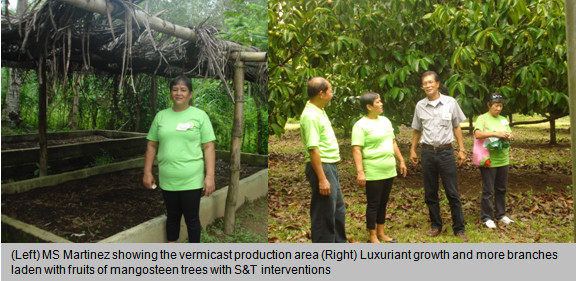Inorganic fertilizer application can be substituted with vermicast or vermin worm manure without affecting the productivity of mangosteen. This, Magsasaka Siyentista (MS) Ruth M. Martinez found out in her Science and Technology-based Farm (STBF) project on mangosteen production at her farm in Brgy. Muan-an in Kidapawan City.
At a technology field day held at her farm, Martinez shared that she applied vermicompost at 5 kg/tree every three months. Then she increased this rate to 10 kg and 20 kg after the fruiting stage. She added that she produces vermicast in her farm using crop wastes mixed with goat manure.
Guests at her farm observed that her mangosteen trees have bigger canopies with more branches laden with big fruits with smooth rind.
Based on the MS’ partial budget analysis during the first cycle of fruit production, her income increased to P153,750 from an added yield of 1,025 kg of mangosteen fruit at P150/kg. In addition, she sold 219 bags of vermicast and 555 kg of earthworms. Vermicast was sold at P250─400/bag; and worms at P300─500/kg.
Dr. Ariston Calvo, a technical expert from the University of Southern Mindanao (USM), explained the benefits and the science behind the MS practice. He attributes the MS’ success to her use of vermicast, which is a rich source of water soluble plant nutrients and microbial energy that enhances uptake of plant nutrients; improves water infiltration and soil water holding capacity; and promotes a strong and healthy root system.
Incidentally, participants during the field day consisted of officials and representatives from the Kidapawan City local government unit, Cotabato Provincial Agricultural Office, Cotabato Agriculture and Resources Research and Development Consortium (CARRDEC), PCARRD, and the Mangosteen Fruit Growers Association in Kidapawan.
The Kidapawan Farmers Information and Technology Service Center, USM, CARRDEC, and PCARRD assisted the MS in the implementation of the project.
